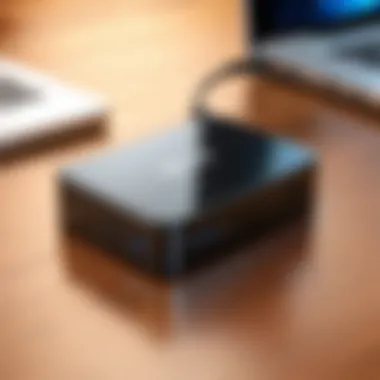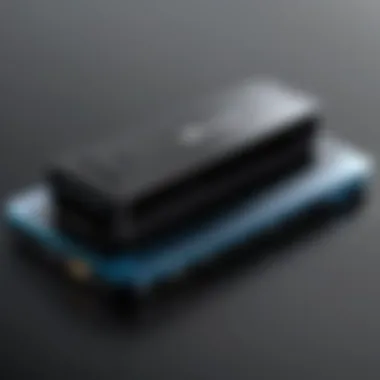Best WiFi Bluetooth Adapters for PC: Top Choices Revealed


Intro
In today's digital landscape, effective computer connectivity is essential. Users expect seamless integration of various devices, from smartphones to gaming controllers, through robust wireless connections. As technology evolves, the demand for dependable WiFi and Bluetooth adapters particularly for PC users grows. These adapters not only enhance connectivity but also ensure swift data transfer and low latency.
With a myriad of options available, selecting the right adapter can be overwhelming. It’s crucial to understand specific needs and expectations. Factors such as compatibility, performance metrics, and user feedback play significant roles in the decision-making process. This guide will dissect top WiFi Bluetooth adapters suited for PC, providing an in-depth look at their specifications, advantages, and limitations. By the end of this exploration, readers will gain insights that allow for informed purchasing decisions, ultimately enhancing connectivity capabilities and user experience.
Product Overview
Brief Description
WiFi Bluetooth adapters are essential tools for connecting PCs to various wireless devices. These adapters bridge the gap between outdated hardware and modern connectivity standards. They enable users to enjoy high-speed internet and connect peripherals wirelessly.
Key Features
The foremost features that define a high-quality WiFi Bluetooth adapter include:
- Dual-band Capabilities: Supports both 2.4GHz and 5GHz frequency bands for enhanced speed and range.
- Bluetooth Version: Compatibility with the latest Bluetooth version improves connectivity with multiple devices.
- Compact Design: Many models offer a portable design, making it easy to carry.
- Plug-and-Play Functionality: Simple installation without the need for additional drivers or software.
Available Variants
Adapters vary significantly in terms of specifications and design. Popular variants include:
- USB Adapters: Convenient and widely compatible with most PCs.
- PCIe Cards: Offer better performance but require opening the computer case for installation.
- Dongles: Compact and easily transportable solutions for users on the go.
Specifications Breakdown
Technical Specifications
Understanding the technical specifications of WiFi Bluetooth adapters is crucial. Key elements include:
- Wireless Standard: Look for adapters supporting Wi-Fi 5 (802.11ac) or Wi-Fi 6 (802.11ax) for optimal performance.
- Supported Bluetooth Profiles: Essential for compatibility with various devices.
- Antenna Type: External antennas can enhance signal strength.
Performance Metrics
Evaluation of performance can be assessed through:
- Data Transfer Speeds: Measured in Mbps, with Wi-Fi 5 offering up to 1300 Mbps and Wi-Fi 6 exceeding that.
- Range: Quality adapters maintain connectivity over substantial distances.
- Latency: Crucial for gaming and streaming, where lower latency means better performance.
Compatibility Information
Before purchasing, check compatibility with your system. Many adapters support Windows, Linux, and macOS, but specific drivers may be required. It's vital to review the product specifications to ensure proper compatibility with your PC's operating system.
Comparative Analysis
Competing Products
The market offers several notable WiFi Bluetooth adapters. Brands like TP-Link, ASUS, and Netgear provide various options tailored to different needs. Each brand presents unique strengths that appeal to various user profiles.
Strengths and Weaknesses
When comparing adapters, consider their strengths and weaknesses. For instance, some may excel in speed but lack in range, while others may offer extensive connectivity options but at a higher price point.
Price Comparison
Price can significantly impact choices. While inexpensive models might save money, they often compromise on performance and durability. Analyzing the cost-to-performance ratio is essential for a satisfying purchase.
Buying Guide
Target User Profiles


Understanding the user’s needs is key:
- Gamers require low latency and high-speed connections.
- General Users may prioritize ease of use and reliability.
- Tech Enthusiasts often seek advanced features and specifications.
Important Considerations
Critical aspects to reflect on include:
- Speed Requirements: Identifying needs based on internet speed and usage.
- Device Compatibility: Ensuring the adapter works with all intended devices.
- User Reviews: Insights from past buyers can illuminate both performance and reliability.
Insider Tips for Buyers
- Do Thorough Research: Look for performance benchmarks and user feedback.
- Check Return Policies: Assess risk before purchasing in case of compatibility issues.
- Consider Future Needs: An adapter catering to present requirements must also accommodate potential upgrades.
Maintenance and Upgrade Insights
Regular Maintenance Practices
To maintain performance:
- Periodically Update Drivers: Keeping software current can resolve bugs and improve performance.
- Optimize Settings: Ensure that network settings match usage needs, potentially enhancing speeds.
Upgrade Paths and Options
As technology evolves, consider:
- Upgrading to Wi-Fi 6 for better connection speeds and efficiency.
- Multi-Band Adapters for enhanced versatility.
Troubleshooting Common Issues
Should connectivity issues arise, basic troubleshooting steps include:
- Rebooting the Adapter and PC: A simple restart can resolve many problems.
- Checking for Interference: Physical barriers or other electronics can impact wireless signals.
Staying informed about improvements in technology will empower users to maximize their connectivity. With the right WiFi Bluetooth adapter, users can ensure a robust and seamless experience.
Prologue to WiFi Bluetooth Adapters
In today's digital environment, WiFi Bluetooth adapters play an essential role for PC users. They bridge the gap between wired and wireless connections, which is increasingly important as technology evolves. These adapters allow devices to connect and communicate seamlessly over wireless networks, enhancing user experience.
Understanding the Role of Adapters in Modern Computing
WiFi Bluetooth adapters serve as critical components in modern computing. They enable wireless connections between computers and various peripherals. This includes printers, headphones, keyboards, and more. By eliminating the need for physical cables, these adapters promote a cleaner workspace. They also offer convenience for users who wish to connect multiple devices without clutter.
Adaptors come in different types, ranging from USB dongles to internal cards. Each type caters to specific needs, allowing users to choose based on convenience and compatibility. The right adapter can also enhance performance. A good adapter will support higher speeds and broader ranges, providing a smooth connectivity experience.
The Importance of Wireless Connectivity
Wireless connectivity is a key enabler in today's connected world. It allows devices to communicate without the limitations of physical connections. Users benefit from increased mobility and ease of setup. Whether in a small home office or a larger work environment, wireless adapters make it possible to connect devices without the mess of cables.
Furthermore, wireless technology continues to advance. New standards are emerging, with improved speeds and reduced latency. This directly impacts gaming, streaming, and other data-intensive applications. Reliable wireless connections are no longer a luxury; they are a necessity for productivity and entertainment.
Wireless adapters not only simplify connections but also enhance the overall computing experience.
Essential Features to Consider
When selecting a WiFi Bluetooth adapter for your PC, understanding the essential features is crucial. The right adapter not only enhances connectivity but also ensures seamless performance across various devices. This section delves into specific elements that impact your user experience, helping you make an informed decision.
Compatibility with Various Operating Systems
Compatibility is a primary concern. Not all adapters support every operating system. Check the adapter's specifications to ensure it works with your version of Windows, MacOS, or Linux. This point directly affects functionality. For instance, an adapter not designed for your OS may not install correctly or deliver expected speeds. Ensuring compatibility can save time and frustration during setup.


Bluetooth and WiFi Standard Support
Understanding the different standards for Bluetooth and WiFi is vital for selecting the best adapter. Compatibility with these standards determines how your devices communicate and how effective the connection will be over distance. Choosing an adapter that supports the latest standards can enhance performance.
Understanding Bluetooth Versions
Bluetooth technology has evolved over the years. Each version comes with enhancements in speed, connectivity, and battery consumption. For example, Bluetooth 5.0 offers double the range and four times the speed compared to its predecessor, Bluetooth 4.2. Choosing a Bluetooth adapter with higher version support means better performance during file transfers and improved connectivity with peripherals like headphones or mice. However, ensure that your devices are also Bluetooth 5.0 compatible to take full advantage of these benefits.
WiFi Standards Explained
Like Bluetooth, WiFi technology has its standards. The most common are 802.11n, 802.11ac, and the latest, 802.11ax, also known as WiFi 6. The standard you choose affects your network's speed and capacity. For instance, WiFi 6 offers faster speeds, lower latency, and better performance in congested areas. However, it's essential to have a router that also supports this standard. Using an adapter with older standards may limit your speed and overall connectivity.
Speed and Range Capabilities
The speed and range of your WiFi Bluetooth adapter directly impact how you experience online activities. Look for adapters that advertise high throughput and extended range. This is especially important for users who stream videos or play online games. Read reviews and performance tests to identify which adapters consistently deliver these attributes.
Form Factor and Design Considerations
The physical design of the adapter holds significance as well. Compact, USB-based adapters are convenient for portability. Larger adapters often come with antennas for improved range. Consider how and where you use your PC. If mobility is key, a smaller design will be beneficial. However, if performance is prioritized, a larger adapter with a more significant range might be the better option.
In summary, understanding these essential features aids in making a well-informed decision regarding WiFi Bluetooth adapters. Each aspect plays a role in maximizing your computer's connectivity capabilities.
Top Picks for WiFi Bluetooth Adapters
Selecting the right WiFi Bluetooth adapter is vital for enhancing your PC's connectivity. These adapters bridge the gap between wired devices and the wireless world, allowing seamless internet access and device communication. In this section, we delve into the top options available, not just by performance, but also by user experience and feature sets. The right pick can streamline your connectivity needs, providing both speed and reliability.
Comprehensive Review of the Best Adapters
Adapter One: Features and Specs
Adapter One stands out due to its exceptional compatibility with various operating systems. This adapter supports Windows, macOS, and Linux, ensuring it can function across a range of devices. A key characteristic of Adapter One is its dual-band capability, which allows for both 2.4 GHz and 5 GHz operations. This versatility is a significant benefit, as it can adapt to the network conditions, offering faster data transfer rates when needed. Moreover, it features a compact, plug-and-play design, making it convenient for users who need a straightforward installation. However, some users have reported connectivity drops in crowded environments, which could be a downside for others needing consistent reliability without interruptions.
Adapter Two: Performance Overview
Adapter Two has received acclaim for its overall user-friendly performance. Featuring Bluetooth 5.0, it provides improved connectivity and range compared to older versions. This adapter excels in scenarios where multiple devices connect simultaneously, supporting multiple profiles for headphones, keyboards, and mice. A unique aspect of Adapter Two is its extended range, allowing users to maintain strong connections at distances that range far from the PC. This can be advantageous for those in larger spaces. On the downside, occasional software compatibility issues on specific operating systems may lead to some frustration during initial setup.
Adapter Three: User Feedback
Adapter Three is renowned for its positive user feedback, particularly among gamers and tech enthusiasts. One notable characteristic is its high-speed data transfer rate, which is essential for gaming and streaming. Many users have commented on the stability of their connections, which enhances their online experiences. The unique feature of Adapter Three is its built-in security protocols, helping users prevent unwanted access to their devices. Nevertheless, some have noted that it lacks support for older Bluetooth devices, which might restrict its usability in environments where legacy connections are required.
Value vs.
Performance Analysis
In analyzing the value versus performance of the top adapters, it becomes clear that each presents a different offering based on user needs.
- Adapter One: Best for broad OS compatibility
- Adapter Two: Ideal for multi-device connections
- Adapter Three: Optimal for gaming and streaming
When weighing these elements, it is essential to match your primary needs with the features of each adapter. The most expensive might not always be the best fit; sometimes, a mid-range adapter meets the specific requirements effectively.
As connectivity evolves, keeping an eye on reviews and feedback remains crucial. Reading user experiences can aid in making informed choices, ensuring you select an adapter that aligns with your expectations.
Installation and Setup
Installing a WiFi Bluetooth adapter may seem simple, but it is a critical step that can determine the effectiveness of your wireless connectivity. Proper installation ensures that your device operates efficiently and maintains a stable connection. For tech enthusiasts and DIY builders, understanding the setup process is key. This section will guide you through the installation steps and common challenges in setting up these adapters.
Step-by-Step Installation Guide
To begin, let's break down the installation process in a step-by-step format. This makes it easier to follow and helps avoid common pitfalls.
- Start by Identifying the Adapter Type: Check the specifications of your WiFi Bluetooth adapter. Is it USB or PCIe? This determines how you will connect it to your PC.
- Prepare Your PC: Ensure your computer is turned off. For PCIe adapters, open your computer case carefully to avoid static discharge.
- Insert the Adapter: If you are using a USB adapter, simply plug it into an available port. For PCIe adapters, line up the adapter with the PCIe slot and press down gently but firmly until it is seated.
- Power On Your Computer: Once the adapter is installed, turn your computer back on.
- Install Drivers: Many adapters will have drivers included on a CD. If not, download them from the manufacturer’s website. Follow the on-screen instructions to complete the driver installation.
- Connect to WiFi or Pair Bluetooth Devices: After installation, access your network settings to connect to your desired WiFi network or pair with Bluetooth devices.
- Run a Test: Finally, ensure everything is working correctly by testing the connection speed and stability.


It is important to take your time with each step. Rushed installations can lead to frustration later. If you encounter difficulties, there are resources available that can offer visual guidance, such as YouTube tutorials or forums on Reddit.
Common Installation Issues and Troubleshooting
Even the most careful installation can sometimes run into issues. Here are some common problems and their solutions:
- Driver Issues: If the adapter is not recognized, check if the correct drivers are installed. This might require uninstalling the current driver and reinstalling the proper one.
- Connectivity Problems: Ensure that no other devices are interfering with the signal. Move electronic devices away from your PC to avoid interference.
- Compatibility Errors: Sometimes the adapter may not work with certain operating systems. Double-check compatibility before purchasing.
- No Connection: Verify that your WiFi is enabled. For Bluetooth devices, ensure that they are discoverable in the settings.
In troubleshooting, a good first step is always to restart the PC after making changes.
Performance Testing of WiFi Bluetooth Adapters
Performance testing is a critical component when selecting the best WiFi Bluetooth adapter for a PC. Understanding how these adapters function under real-world conditions can help ensure optimal performance and reliability. In this section, we analyze the fundamental aspects of performance testing, focusing on measuring speed, latency, range, and connectivity stability. These factors play an essential role in determining whether an adapter meets user needs, especially for tech enthusiasts, gamers, and DIY builders.
Measuring Speed and Latency
Speed and latency are crucial metrics that directly impact user experience with wireless connectivity. Speed refers to the data transfer rate an adapter can achieve while latency indicates the delay before any data transfer begins. The interplay between these two elements can determine how seamless an online experience feels.
- Download and Upload Speeds: It is important to test both download and upload speeds in various scenarios. Speed tests can reveal how well an adapter performs during heavy internet usage.
- Latency Measurements: Latency can be assessed using ping tests in a local network. A lower average ping time indicates better performance, which is especially vital for activities like online gaming or video conferencing.
- Impact of Environmental Factors: Different environments can also affect performance. Obstacles, such as walls and other electronic devices, may interfere with signal strength, altering both speed and latency.
Documenting these metrics is essential for a complete picture of how an adapter will perform in a real-world setting. It is recommended to perform these tests under various conditions to get the most accurate representation of speeds achievable.
Evaluating Range and Connectivity Stability
Range and connectivity stability are equally important when assessing a WiFi Bluetooth adapter's performance. An adapter may promise impressive speed but can falter if it cannot maintain a stable connection over distance.
- Distance Testing: One way to evaluate range is by determining the maximum distance at which the adapter can still connect to a router without losing signal quality. Testing should occur where the device will mostly be used, such as different rooms if the PC is in a home environment.
- Signal Stability: To measure connectivity stability, it’s helpful to monitor the connection over time. Look for fluctuations in signal strength or unintended disconnections during extended use. An adapter that frequently disconnects can seriously disrupt activities like streaming or gaming.
- Interference Observations: It is also wise to take note of nearby electronic devices that may interfere with the signal. Certain devices, like microwaves or cordless phones, can hinder connectivity, particularly in shared spaces.
Understanding both speed and range will allow users to select an adapter that meets their needs effectively. A thorough examination of these performance testing elements can lead to more informed purchasing decisions and improved overall connectivity.
Overall, performance testing serves as a foundation for comparing various WiFi Bluetooth adapters. By measuring speed, latency, range, and connectivity stability, users can ensure they choose an adapter that aligns with their specific requirements.
User Experiences and Reviews
User experiences play a crucial role in understanding the practical implications of using WiFi Bluetooth adapters. Reviews from real users offer insights that manufacturers' specifications cannot fully encapsulate. They reveal how effectively an adapter performs in diverse real-world situations. These experiences can identify strengths and weaknesses, helping potential buyers make informed decisions.
Additionally, user feedback often highlights compatibility issues and unexpected performance bottlenecks. For tech enthusiasts, gamers, and DIY builders, genuine experiences can guide choices based on specific use cases. Whether one is focused on gaming, streaming, or general use, the nuances in user feedback can distinguish between an average product and a top performer.
What Real Users are Saying
Real users provide valuable feedback on the WiFi Bluetooth adapters they have purchased. Many report their experiences on platforms like Reddit or tech forums, discussing aspects such as ease of installation, speed capabilities, and overall satisfaction. The insights from these users often summarize their journeys, from selecting an adapter to its integration with their systems.
- Ease of Installation: Users appreciate adapters that are simple to set up. An adapter like the TP-Link Archer T3U often receives positive remarks for its user-friendly installation process.
- Performance: Many gamers focus on low latency and high-speed transfer rates. Products like the ASUS USB-AC68 are highlighted for their robust performance in high-demand scenarios.
- Compatibility: Feedback on compatibility with various operating systems also emerges frequently. Users often share experiences regarding how well an adapter integrates with Windows or Linux systems, noting any challenges faced during setup.
Case Studies of Success and Challenges
Analyzing specific case studies offers deeper understanding. Some users share stories of how choosing the right adapter significantly improved their online gaming experience. For example, a gamer transitioning from a low-quality adapter to the Netgear AC1200 reported a drastic reduction in lag and interference. This change enabled smoother gameplay and better connectivity during crucial gaming moments.
Conversely, challenges also surface in these discussions. Users have pointed out situations where certain adapters failed to connect seamlessly to devices, leading to frustrations that range from minor inconveniences to major disruptions. For example, a user struggling with the Bluetooth connectivity of the Intel AX200 documented the steps taken for troubleshooting, including driver updates and hardware compatibility checks. Such cases are critical for readers to consider as they navigate their own selection processes.
“Choosing a reliable WiFi Bluetooth adapter can mean the difference between seamless connectivity and frustrating disconnections. User reviews provide insights that can guide you toward the best options.”
In summary, user experiences and reviews encompass a wealth of practical wisdom. They help demystify the technical specifications often provided by manufacturers. By gathering information from a knowledgeable community, potential buyers can better evaluate which WiFi Bluetooth adapter aligns with their needs and preferences.
Finale
Summary of Key Takeaways
- Compatibility is Key: Not all adapters are made equal. Check what operating systems are supported before making a purchase.
- Performance Metrics Matter: Look at speed and range capabilities to ensure that the adapter suits your usage needs.
- User Insights Are Valuable: Real customer feedback can provide insight into how an adapter performs in everyday scenarios.
- Common Installation Issues: Understanding potential issues can save time and frustration during setup.
Final Recommendations
For those in the market for a WiFi Bluetooth adapter, consider these recommendations:
- TP-Link UB500: Excellent compatibility and good performance metrics make this a solid choice for most users.
- Asus USB-BT500: Known for its reliability and speed. Ideal for gamers who require low latency.
- ZEXMTE USB Bluetooth Adapter: A budget option that still delivers good functionality.
Ultimately, choose based on your specific needs and budget. The proper adapter can significantly improve your device's capabilities, creating a seamless connection experience.



